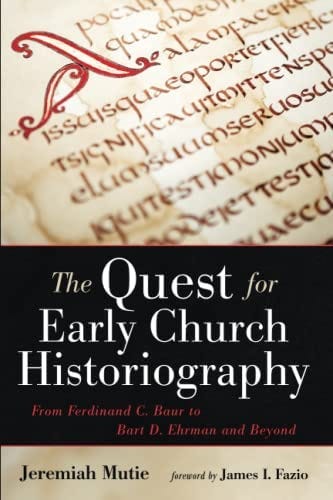The Quest for Early Church Historiography: From Ferdinand C. Bauer to Bart D. Ehrman and Beyond
Mutie, Jeremiah. (Eugene: Wipf and Stock, 2022)
Bart D. Ehrman is a scholar with whom many people are familiar. He’s popularized a view of Christianity that now seems to be taken for granted among unbelievers, representing Christian doctrine as the product of an evolutionary development that took place over a significantly long period of time. Ehrman’s thesis posits that there was no original doctrinal unity among Christians (i.e. an original orthodox set of beliefs to which any professing Christian must adhere); instead, there was a diverse range of communally formed and maintained beliefs about the historical Christ (about whom we know very little). According to this thesis, the notion that there was always a set of orthodox beliefs, of which major deviations constitute heresy that places one outside of the church, was developed and pursued for the sake of exercising power. In this view, a singular form of Christianity did not exist. There were, instead, a variety of Christianities.
But is this the case? In a word, No. There is ample evidence from the Scriptures themselves to the writings of the early church fathers to demonstrate that Christians had always held to an original orthodoxy, and that those who wrote the texts we now call the “Pseudopigrapha” were individuals who deviated from that unified profession of faith. On what basis, then, does Ehrman build his historiographical thesis? This is what Dr. Jeremiah Mutie answers in his book The Quest for Early Church Historiography: From Ferdinand C. Bauer to Bart D. Ehrman and Beyond. Mutie traces the genealogy of Ehrman’s thesis, and uncovers its foundational commitment to a series of thinkers who philosophically opposed traditional historiography. It is from the theses of those scholars that Ehrman has formed his own radically skeptical view about orthodoxy among the earliest post-NT churches and whether it preceded or succeeded a plurality of theologies and writings and groups claiming to be Christians.
What Mutie’s writing makes clear is that Ehrman’s thesis is not at all based on objective documentary evidence, but commitment to a philosophical worldview. Ehrman, and his like-minded colleagues, interprets the data in light of his presupposed philosophical foundation. Yet this is something that most people, who are not trained in historiography or philosophy, fail to see. Thankfully, Mutie’s work economically, but also substantively, reveals the influence of Ehrman’s predecessors on his Bauer-Ehrman thesis.
Mutie’s presentation is not only economic and substantive, but widely accessible. While his subject matter is academically dense and rich, he manages to patiently lead his reader through the oft-forgotten world of higher level biblical, historical, theological, and philosophical studies. This is not an easy task, especially given the scope of history with which he is dealing. What is more, the reader will follow Mutie’s argument, and learn much about the arcane subject of New Testament historiography, a field typically familiar only to other academics.
The Quest for Early Church Historiography objectively demonstrates that it is philosophy, and not actual historical scholarship, that underlies the work of scholars like Bart D. Ehrman and others who deny that there was ever an original orthodox form of Christianity. Questions concerning methodology need to be examined and subjected to scrutiny before conclusions based upon them are even considered for evaluation, and this is something of which Christians ought to be aware. Mutie manages to place this knowledge within the reach of a wide variety of Christians, scholars and non-scholars alike. So when objections to the faith once for all delivered to the saints are raised on the basis of the Bauer-Ehrman thesis, Christians will be able to identify those objections as such, confidently and knowledgeably respond to them.
I think it is highly beneficial to the body of Christ at large, and, more specifically, to pastors, theologians, and apologists.



